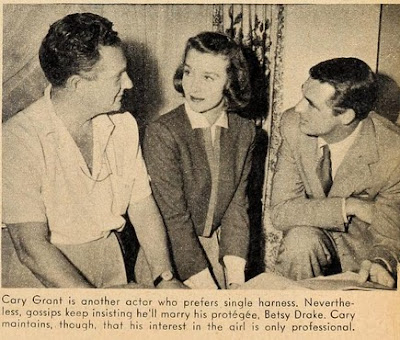The film revolves around Anabel (Betsy Drake), the over-eager and a bit stalker-ish protagonist who sets her sights on Dr. Madison Brown (Cary Grant). Obsessed with marriage and babies, Anabel learns everything she can about Dr. Brown and puts herself in places she knows he will be. In the role of Anabel, actress Betsy Drake is an odd mixture of quirkiness, spunkiness, and devotion, a combination that can border on annoying for some viewers.
To be honest, Betsy's performance has grown on me with each viewing. I love her fresh-faced beauty, the way she dresses in simple clothes and simple hairstyle, and her interesting speaking voice. The character of Anabel, however, absolutely goes too far with some of her romantic schemes and I can see how that might come across as the opposite of attractiveness. From the beginning, Anabel asserts a modern view that women should be able to chase men just as aggressively as men chase women. But the character's old-fashioned obsession with being a wife and mother at any cost negates that progressive notion. Having said that, the film is still a great deal of fun with fantastic performances from its main cast.
That rival comes in the form of Roger Sanford (Tone), the wealthy, twice-divorced owner of the department store in which Anabel works. Madison has caught on to Anabel's intentions, so Anabel attempts to throw him off the trail by telling him that she is actually using him to get to Roger! A self-assured ladies' man, Roger assumes Anabel truly does want him, despite her private protests that it's Madison she's after. Following a date in which she must escape the amorous Roger's physical advances, Anabel puzzles her boss by passionately kissing him on a busy street. Newspaper photographers are on hand to capture the kiss and soon Anabel is approached by tons of companies to endorse their products. Businessmen hope that if Anabel likes their products that the rich Roger Sanford (now frustrated with Anabel's antics) will invest in them.
Although a second lead, Roger is one of Franchot's best roles of the late 1940's. Franchot performs the part of the carefree, self-absorbed Roger with a lightness that complements Betsy Drake's goofy, but sometimes intense Anabel. Everyone knows that Cary Grant will get the girl in a Cary Grant picture, but Franchot's Roger is a likeable, handsome, and entertaining rival. (Franchot lost the girl to Cary once before—Jean Harlow in the 1936 drama Suzy.)
Anabel passes on all the free products offered to her. All but one—a cozy cottage that she is allowed to live in for one month. Madison agrees to dinner at the cottage, but disappoints Anabel. She asks, "Isn't everything so lovely and romantic?" Madison, fully aware of how the romantic dinner, cottage setting, and marriage conversation fit into her plan, responds, "Almost like a stage setting." When she presses forward, Madison confesses:
Well, I'll tell you what I actually do think Anabel. Uh, I don't know quite how I'm going to go about telling you this, but I want to be as much on the level with you as I know how to be. Now, you see, I don't consider myself any prize package. That's why this is going to be so difficult, but it's just got to be done because there's something I want you to understand. Clearly. Once and for all. Now, now just a second. Just hear me out and please don't try to twist my words around to suit yourself. I'm not in love and I have no intention of getting married. I think you're far too fine a person to persist in these silly schoolgirl maneuvers of yours. It'll only mean you'll end up embarrassed, hurt, and I don't want that to happen.By the time Madison finishes his speech, Anabel is already embarrassed and hurt. She seems genuinely devastated by his words.
Depressed over Madison's rejection, Anabel is surprised to learn that Roger is in love with her now that he realizes Madison is truly a rival. Roger's marriage proposal proves that Anabel's plan of rivalry worked. Just with the wrong man!
What results is an incredibly humorous evening with not two but three suitors (Eddie Albert joins the fun as Anabel's high school sweetheart Old Joe) vying for Anabel's affection in her cottage. The final scene includes some unexpected revelations from Madison and Anabel, which I seem to forget between viewings and am happily surprised by each time.
Enhancing the romantic comedy is the fact that Cary Grant would, of course, marry his costar Betsy Drake in 1949. Cary had seen Betsy performing in a London play in 1947, been impressed with her acting, and encouraged her to pursue a film career (and the film executives to sign her to a contract.) Every Girl Should Be Married was Betsy's first film. She would costar with Cary (with whom she was married until 1962) in 1952's Room for One More, a favorite film of mine.
 |
| Source: Modern Screen. http://lantern.mediahist.org/ |
 |
| Source: Modern Screen. http://lantern.mediahist.org/ |
 |
| Source: Modern Screen. http://lantern.mediahist.org/ |





































